|
|
|
Sort Order |
|
|
|
Items / Page
|
|
|
|
|
|
|
| Srl | Item |
| 1 |
ID:
095160
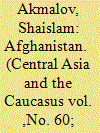

|
|
|
|
|
| Publication |
2009.
|
| Summary/Abstract |
For three decades now the country has been struggling for survival amid a never-ending armed conflict that makes a concerted foreign policy course impossible. This is fraught with a loss of statehood and is responsible for Afghanistan's role and place in the international relations system.
|
|
|
|
|
|
|
|
|
|
|
|
|
|
|
|
| 2 |
ID:
095163
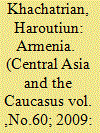

|
|
|
|
|
| Publication |
2009.
|
| Summary/Abstract |
The world crisis interrupted the stable economic growth Armenia had been enjoying for the past fifteen years. Progressive development began in 1994, whereby between 2001 and 2007 the growth indices reached double digits. In 2008, the increase in GDP came to a halt due to the Russian-Georgian war and amounted to only 6.8%. And as early as the first six months of 2009, the GDP began to decrease, dropping as low as 16.3% compared to the same period of the previous year, which is one of the worst indices for the entire CIS. In July, the drop in GDP amounted to 18.7%, which encouraged people to think that the crisis had bottomed out.
|
|
|
|
|
|
|
|
|
|
|
|
|
|
|
|
| 3 |
ID:
095171
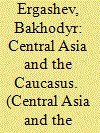

|
|
|
|
|
| Publication |
2009.
|
| Summary/Abstract |
On the whole, little or no attention is paid to the forecasts of post-crisis development in Central Asia and the Caucasus that are scattered among the publications on the post-crisis world. Indeed, so far these regions essentially remain outside the global industrial market, while the raw-material orientation of their economies allowed practically all eight of them to avoid serious socioeconomic upheavals. It is impossible, however, to supply an exhaustive forecast of the crisis' economic, political, cultural, demographic, and other impacts.
|
|
|
|
|
|
|
|
|
|
|
|
|
|
|
|
| 4 |
ID:
095162


|
|
|
|
|
| Publication |
2009.
|
| Summary/Abstract |
Sixteen years after the Sochi agreements an uneasy truce between Georgia and South Ossetia gave way to renewed violence in August 2008. The protracted peace process with lengthy and futile negotiations led to few agreements between the conflicting sides, which were often faulted at the implementation phase. Material and human costs of a failed peace process were huge: hundreds of civilian deaths, thousands of wounded, tens of thousands of people displaced, and millions of Euros spent on rehabilitation projects by local and international actors vanished within days.
|
|
|
|
|
|
|
|
|
|
|
|
|
|
|
|
| 5 |
ID:
095161
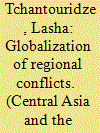

|
|
|
|
|
| Publication |
2009.
|
| Summary/Abstract |
Globalization in international relations is perhaps best understood in terms of increased interdependence in the international system. This interdependence manifests itself in both economic and military affairs. Since World War II, the United States has been the leading force behind "globalizing" processes: as economic interdependence leads toward more open markets, and military interdependence makes global affairs more peaceful, it has been in the vital interest of Washington to rid the world of isolationist and militarily autarkic powers.
|
|
|
|
|
|
|
|
|
|
|
|
|
|
|
|
| 6 |
ID:
095166


|
|
|
|
|
| Publication |
2009.
|
| Summary/Abstract |
During the past two years, the world economy has been functioning in the conditions of a global financial crisis that is having an impact on the economic development of almost every country in the world. The republic of Kazakhstan, which succeeded during the years of its independence to occupy a dignified place in the world economy, is no exception. It was the first CIS country (and one of the first in the world) to become caught in the grips of the financial crisis.
|
|
|
|
|
|
|
|
|
|
|
|
|
|
|
|
| 7 |
ID:
095169
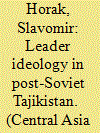

|
|
|
|
|
| Publication |
2009.
|
| Summary/Abstract |
Ideology is one of the foundations of authoritative regimes and forms the image of their leaders. Using Uzbekistan as an example, A. March comes to the conclusion that the ideological system imposed by the state has a tangible impact on society, even one that has already lived at one time under the communist ideology. Based on an analysis of several special features of the development of the post-Communist countries (and several others), the conclusion is drawn that during a political regime change, the population can be ideologically "reset." After a new ideology has been repeatedly fed to the people over the span of several years, it becomes a conscious or subconscious element of society's mindset. Thus ideology plays a significant role in state- and nation-building, particular after the formation of new states or territorial units.
|
|
|
|
|
|
|
|
|
|
|
|
|
|
|
|
| 8 |
ID:
095172


|
|
|
| 9 |
ID:
095170


|
|
|
|
|
| Publication |
2009.
|
| Summary/Abstract |
Early in the 21st century, the effects of the Soviet Union's disintegration are only just starting to come to the fore, but I am convinced that the old world order is already dead.
Indeed, deprived of an external threat, the United States has been gradually losing its former role as global hegemon, while liberal democracy has proven unable to maintain its former Great Power status. The fear of the "red plague" in the East disappeared together with the Soviet Union; the old ideological bonds have slackened, while a new ideology is being formulated on the basis of particular interests. The political elite is still clinging to its imperial ambitions, however its social support is dwindling.
|
|
|
|
|
|
|
|
|
|
|
|
|
|
|
|
| 10 |
ID:
095168


|
|
|
|
|
| Publication |
2009.
|
| Summary/Abstract |
Political science defines "political regime" in a variety of ways, yet only two of the definitions are commonly accepted. One of them relies on the political and legal, or institutional, approach, while the other is based on sociology. However they agree when it comes to an understanding of the diverse relations between the government and society.
|
|
|
|
|
|
|
|
|
|
|
|
|
|
|
|
| 11 |
ID:
095164


|
|
|
|
|
| Publication |
2009.
|
| Summary/Abstract |
The former Soviet republics, including Georgia, achieved their state independence, which brought with it a multitude of problems. The former economic ties broke down and there was not enough qualified personnel to promote the development of a market economy, so many enterprises ceased to exist, and the country's economy collapsed. The main task was to restructure the national economy.
|
|
|
|
|
|
|
|
|
|
|
|
|
|
|
|
| 12 |
ID:
095159
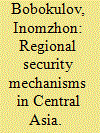

|
|
|
|
|
| Publication |
2009.
|
| Summary/Abstract |
Security regionalization is one of the most striking features of international relations in a world where the formerly clear boundaries of national security are rapidly disappearing. The region is developing into an important factor of universal peace and stability. This, in turn, is largely changing our traditional ideas about the means and methods of national security as a sine qua non of sovereign states' stability.
|
|
|
|
|
|
|
|
|
|
|
|
|
|
|
|
| 13 |
ID:
095167


|
|
|
|
|
| Publication |
2009.
|
| Summary/Abstract |
The most urgent tasks of the present day are to make an objective assessment of the reasons for the emergence of the global financial and economic crisis that broke out in 2008 and draw up a program of measures for overcoming its negative consequences.
As world experience shows, crises inevitably give rise to political instability and an increase in crime and corruption throughout the world (for example, the 1847-1849 crisis led to revolutions in many European countries, while the Great Depression of 1929 generated Fascism). Moreover, such conditions may cause an abrupt change in the functioning of political institutions and push to the foreground aggressive forces that used to be considered secondary and marginal (anarchism, Nazism, neo-Fascism, and racism). The elections held recently in the European countries (including to the European Parliament) are clear proof of the real possibility that such threats may arise.
But during the first weeks of 2008, essentially all international experts regarded the situation in the world economy as favorable. Society did not take the warnings of some analysts about the impending crisis seriously.
|
|
|
|
|
|
|
|
|
|
|
|
|
|
|
|
| 14 |
ID:
095165
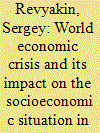

|
|
|
|
|
| Publication |
2009.
|
| Summary/Abstract |
The world financial crisis, which began with the collapse of the U.S. credit pyramid, is known to be the biggest crisis since the Great Depression.
The first signs of the crisis appeared in the U.S. mortgage market in 2006 (housing loans were not being repaid), and shortly afterwards this market collapsed, triggering a global liquidity crisis. Housing prices in the U.S. plummeted, investments in housing construction fell, and the liquidity of the mortgage derivatives market began to decline. All of this took place against the background of a jump in credit spreads in money markets; the stocks of international companies plunged, and stock indexes fell significantly due to the bankruptcy of major financial institutions, primarily investment banks.
|
|
|
|
|
|
|
|
|
|
|
|
|
|
|
|
|
|
|
|
|